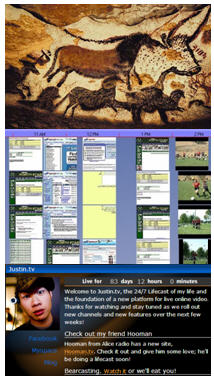From cave paintings to camera phones


He traces the phenomenon from painting on cave walls to cheap camcorders and now camera phones, and cites Gordon Bell's MyLifeBits project and Twitter as latter-day examples.. He could add Justin.tv to the bunch.
In his summation, Nick offers some possible explanations for self-recording as expression obsession:
What exactly is behind our rage to document the minutiae of our daily existence? That's hard to say. Maybe it's just another manifestation of modern-day narcissism. Maybe it's a byproduct of our media-saturated culture, with its sense that nothing's real until it's been recorded and broadcast. Or maybe it goes deeper than that. In striving to preserve the moments of our lives, to immortalise them, might we simply be expressing our fear of death?
Adding to Nick's possible explanations, the self-recording obsession may be more a case of initial rapture with the increasingly capable digital, multimedia tools and the Internet, which allow anyone to become an instant publisher. After a while, the urge to purge oneself online and point the camera toward human activity in public or private wears off. You first get your HD video camera or 10-megapixel still camera and take it everywhere, recording with unbridled enthusiasm. Then the initial fascination wears off and the camera gathers dust.
However, the more casual digital recording culture, people depositing the breadcrumbs of their daily lives, will continue to evolve, adding exabytes of data to the cloud. Camera phones will deliver high-quality video and still photos, with immediate upload and delivery across the Internet. And, 'security' cameras are going to be everywhere, strategically located to record our public lives whether like it or not.
Cave paintings drawn more than 30,000 years ago rarely had human forms, and are composed of mostly wild animals, perhaps depicting hunting and gathering scenes. Today we shop in supermarkets for food, and spend more of our time focused on ourselves as subject and object. As Nick concludes in his column, "We're so busy recording our lives that we have little time left to examine them. And perhaps that, more than anything else, is the real point."